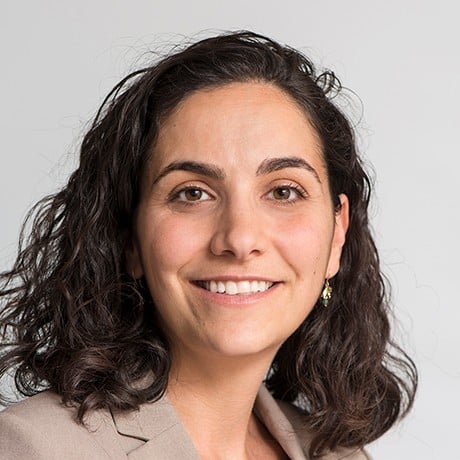
Dr. Elizabeth Pinsky is a pediatrician and child psychiatrist working to illuminate the health risks of climate change – especially among kids, who face the most severe impacts. Dr. Pinsky is a physician at Massachusetts General Hospital as well as Associate Director for Advocacy at the Mass General Center for Environment and Health, and she has recently taken on the role of staff leader for the GRC’s Health Care Working Group. This means she will be helping to facilitate the working group, identify opportunities for collaboration and move partnerships forward.
As Mass General Brigham takes on management of the Health Care Working Group, now chaired by Niyum Gandhi, Chief Financial Officer of Mass General Brigham, the GRC talked with Dr. Pinsky about her path into medicine and her role as a climate advocate.
- What made you want to become a pediatrician?
I’ve always known I wanted to work with kids. Even as a kid, I always found kids younger than me to be most interesting. I went to medical school expecting to do pediatrics. I just found adults and adult diseases depressing! While I was in med school, I learned so much about how the environment that kids are in – their exposure to trauma, their caregivers, their stability – impacts their health.
- What was the moment you decided to make climate advocacy a part of your professional life?
When the Intergovernmental Panel on Climate Change report came out in 2018, that really became my climate awakening. My own kids were two and five at the time. That report reinforced that climate change wasn’t some distant threat – it was a threat to me and my children. So, I had a freak out – then I realized my whole job is talking to kids and adults about both hard things and about hope. I knew I could align my personal and professional lives and had useful skills I could bring to climate work.
- Recently, you and three colleagues, in collaboration with the University of Virginia Environmental Law and Community Engagement Clinic, filed an amicus brief in support of 16 young people in Montana who argued – and won – that the state violated their right to a clean environment. What compelled you to weigh in on that particular case?
This was an important case in how it explicitly connected climate and health. It established that the state was violating these young people’s constitutional right to a “clean and healthful” environment by allowing fossil fuel expansion without regard for climate impacts. We know that climate change is a human health emergency that impacts every system of the human body, with kids impacted more than adults.
Doctors are trusted messengers. When we had the opportunity to describe the facts about climate and kids’ health, we knew it was important to share with the court how direct, significant, and evidence-based the links are.
We were gratified in how our contribution seemed to have impacted the outcome, with our brief cited in the decision.
- Are you seeing increasing stress and anxiety among young people due to climate concerns?
I’m definitely seeing stress and anxiety. That’s both my observation in my professional life and confirmed by survey data. Kids are feeling fear, grief, and anger. For many young people, climate is impacting thoughts about their future, whether even to have kids. I see many feeling understandable anger and a sense of betrayal at older generations.
- Mass General Brigham has recently taken on the management of the GRC’s Health Care Working Group. What hopes do you have for that group in the year ahead?
Boston is the epicenter of medicine. We have an unmatched concentration of world-class hospitals, medical schools, and biotech companies. Our innovations reduce suffering and make people healthier every day. Climate change is fundamentally a human health crisis. Of course our institutions can and should be on the cutting edge in that space, as well!
Climate solutions are health solutions, and we have the opportunity to demonstrate for the nation how decarbonization can make a city stronger, healthier, and more just.
Healthcare is a significant contributor to emissions, and reducing our own contribution is critical, but we have the opportunity to do so much more. I am excited about how the sector can come together to think big about emissions reductions, including those related to our supply chains, but also about making our systems more resilient and our communities more livable, and about how we can leverage our unified voice as healthcare providers to advocate for change that is rapid and equitable.
Learn more about the GRC’s Health Care Working Group here.